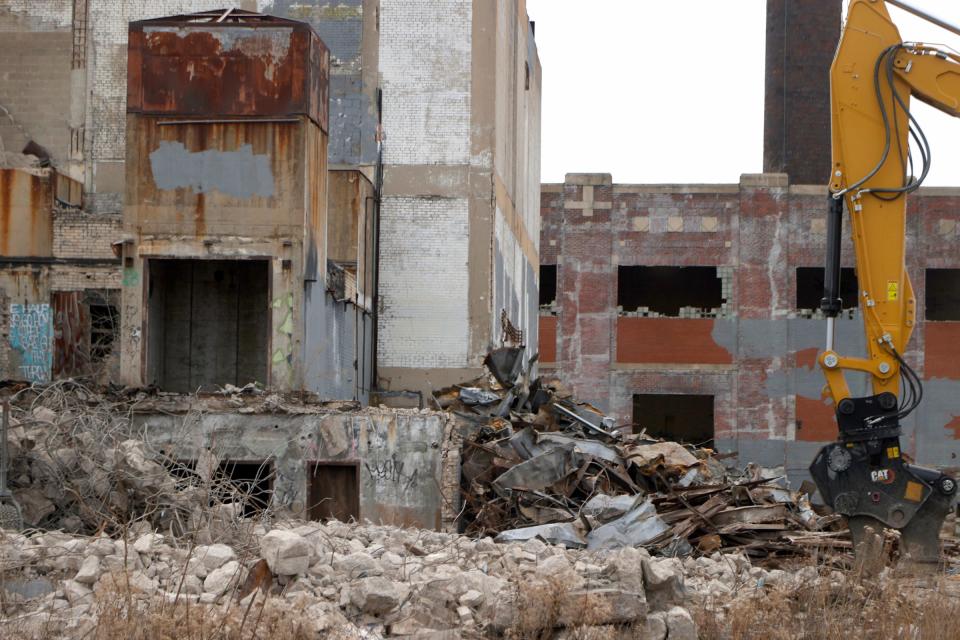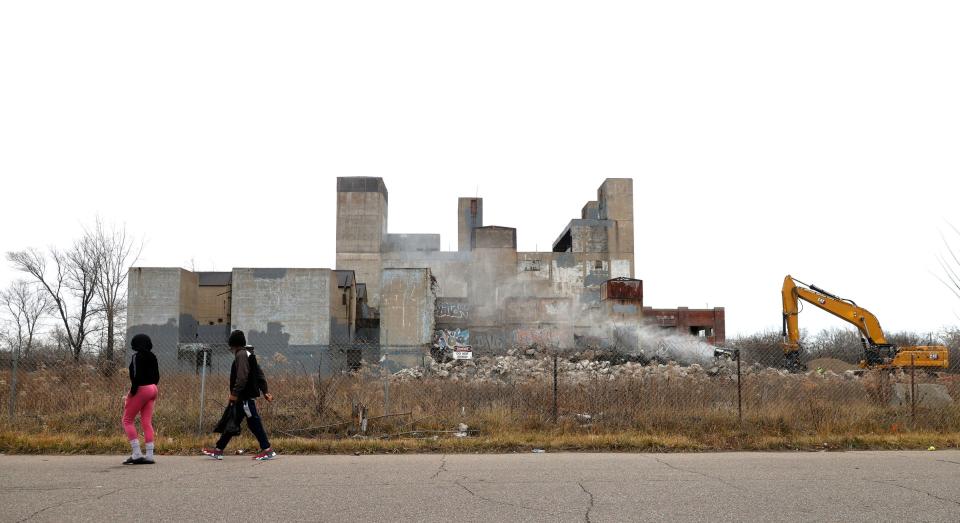Demolition begins of Continental Motors ruins in Detroit

Demolition has begun on remnants of an industrial ruin on Detroit's east side, which may be the future site of a self-storage facility.
Crews and equipment from Adamo Demolition Co. this week have been tearing down portions of the 110-year-old Continental Motors Co. plant at 1610 Algonquin St.
The owner of the property is a limited liability company linked to a Miami, Florida-based firm, MCSS Self-Storage, that develops self-storage sites in urban settings.
The once-sprawling plant was designed by architect Albert Kahn and opened in 1912. It originally made car engines, later producing tank and aircraft engines during World War II, and briefly auto engines again after the war, according to the Historic Detroit website.
Much of the plant was razed decades ago after its engine business sputtered out. The structures that remain include engine "test cells," a large graffiti-covered concrete building and an old powerhouse with a brick smokestack featuring "Continental" in vertical white lettering.

The last significant business to operate at the site was a scrap aluminum recycling operation, Continental Aluminum, which left in the late 1990s, according to recollections on an Internet message board by a former employee. Continental Aluminum wasn't connected to Continental Motors, but rather adopted that company name to fit its location there.
More:Crews begin demolition of a portion of Detroit's Packard Plant
More:Detroit's Core City project revitalizes abandoned Detroit buildings, land
The city of Detroit issued a demolition permit late last month for Adamo to take down the test cells structures. The permit doesn't appear to apply to the old powerhouse building; an asbestos abatement notice for the powerhouse was signed by a contractor over the summer.
An Adamo representative Tuesday referred all questions about the scope of the demolition work to the site's owner. MCSS Self-Storage did not return a message seeking comment.
The roughly 7-acre site straddles industrial and residential areas. It is near the Stellantis Detroit Assembly Complex-Jefferson, formerly known as Chrysler's Jefferson North Assembly Plant. Years ago, there was a row of houses behind the property, although today nearly all of them are gone.
One resident who lives near the area said the remnants of the plant have long been an eyesore and pollution concern, and he would be glad to see the abandoned structures go.
"Quite a few people have been trying to get that plant torn down for years," James "Jack Rabbit" Jackson said Tuesday.
In 2018, Detroit developer Philip Kafka bought the Continental Motors plant site from a Continental Aluminum affiliate for $208,000, land records show.
Kafka recalled Tuesday how he bought the property with the intention to save the plant ruins and build developments around them, similar to his recent mixed-use development in Detroit's Core City neighborhood that has architecturally distinct housing as well as local businesses.
At one point, Kafka said he even turned down an offer by what is now Stellantis to buy the plant site. But he eventually decided to part with the property.
“I just had too much on my plate," Kafka said. "I am a small-scale developer and I’m not trying to do things at scale. I’ve got so much work to continue to do in Core City that it was very hard for me to begin to think about doing the work that I'm doing, which is very difficult work, in two places.”
He sold the property to the current owner for $817,000 in October 2021, land records show. Kafka said he only made a small profit on the sale after accounting for the costs of securing the property and cleaning it up, including for tours by architecture students from several universities.
"I make money as a developer, not as an investor," he said. "I didn’t buy the property to flip it. So I just wanted to get my money out of it, and get back to Core City.”
Kafka said the Florida buyer was at the time of the sale considering the site for possible self-storage or multifamily developments.
Contact JC Reindl: 313-222-6631 or jcreindl@freepress.com. Follow him on Twitter @jcreindl.
This article originally appeared on Detroit Free Press: Demolition begins of Continental Motors industrial ruins in Detroit
